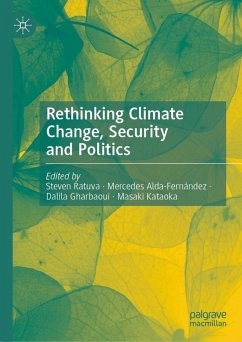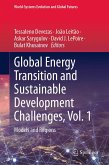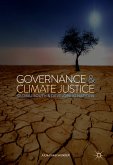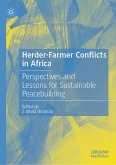Rethinking Climate Change, Security and Politics (eBook, PDF)
Redaktion: Ratuva, Steven; Kataoka, Masaki; Gharbaoui, Dalila; Alda-Fernández, Mercedes
104,95 €
inkl. MwSt.
Sofort per Download lieferbar

52 °P sammeln
Rethinking Climate Change, Security and Politics (eBook, PDF)
Redaktion: Ratuva, Steven; Kataoka, Masaki; Gharbaoui, Dalila; Alda-Fernández, Mercedes
- Format: PDF
- Merkliste
- Auf die Merkliste
- Bewerten Bewerten
- Teilen
- Produkt teilen
- Produkterinnerung
- Produkterinnerung

Bitte loggen Sie sich zunächst in Ihr Kundenkonto ein oder registrieren Sie sich bei
bücher.de, um das eBook-Abo tolino select nutzen zu können.
Hier können Sie sich einloggen
Hier können Sie sich einloggen
Sie sind bereits eingeloggt. Klicken Sie auf 2. tolino select Abo, um fortzufahren.

Bitte loggen Sie sich zunächst in Ihr Kundenkonto ein oder registrieren Sie sich bei bücher.de, um das eBook-Abo tolino select nutzen zu können.
The book provides a critical analysis of the nexus between climate change, security and politics, especially in relation to the role and impact of societal agencies such as states, corporations, military, financial institutions and community organizations in framing and responding to climate change using various forms of social, economic or political leverage. Climate change is a major existential security threat to the planet and humanity, yet there is continuing debate as to how it should be approached.
- Geräte: PC
- ohne Kopierschutz
- eBook Hilfe
- Größe: 16.36MB
Andere Kunden interessierten sich auch für
![Global Energy Transition and Sustainable Development Challenges, Vol. 1 (eBook, PDF) Global Energy Transition and Sustainable Development Challenges, Vol. 1 (eBook, PDF)]() Global Energy Transition and Sustainable Development Challenges, Vol. 1 (eBook, PDF)112,95 €
Global Energy Transition and Sustainable Development Challenges, Vol. 1 (eBook, PDF)112,95 €![Global Energy Transition and Sustainable Development Challenges, Vol. 2 (eBook, PDF) Global Energy Transition and Sustainable Development Challenges, Vol. 2 (eBook, PDF)]() Global Energy Transition and Sustainable Development Challenges, Vol. 2 (eBook, PDF)112,95 €
Global Energy Transition and Sustainable Development Challenges, Vol. 2 (eBook, PDF)112,95 €![Governance & Climate Justice (eBook, PDF) Governance & Climate Justice (eBook, PDF)]() Julia PuaschunderGovernance & Climate Justice (eBook, PDF)104,95 €
Julia PuaschunderGovernance & Climate Justice (eBook, PDF)104,95 €![Governance & Climate Justice (eBook, PDF) Governance & Climate Justice (eBook, PDF)]() Julia PuaschunderGovernance & Climate Justice (eBook, PDF)72,95 €
Julia PuaschunderGovernance & Climate Justice (eBook, PDF)72,95 €![Public Brainpower (eBook, PDF) Public Brainpower (eBook, PDF)]() Public Brainpower (eBook, PDF)56,95 €
Public Brainpower (eBook, PDF)56,95 €![Herder-Farmer Conflicts in Africa (eBook, PDF) Herder-Farmer Conflicts in Africa (eBook, PDF)]() Herder-Farmer Conflicts in Africa (eBook, PDF)96,95 €
Herder-Farmer Conflicts in Africa (eBook, PDF)96,95 €![The Climatization of Global Politics (eBook, PDF) The Climatization of Global Politics (eBook, PDF)]() The Climatization of Global Politics (eBook, PDF)80,95 €
The Climatization of Global Politics (eBook, PDF)80,95 €-
-
-
The book provides a critical analysis of the nexus between climate change, security and politics, especially in relation to the role and impact of societal agencies such as states, corporations, military, financial institutions and community organizations in framing and responding to climate change using various forms of social, economic or political leverage. Climate change is a major existential security threat to the planet and humanity, yet there is continuing debate as to how it should be approached.
Dieser Download kann aus rechtlichen Gründen nur mit Rechnungsadresse in A, B, BG, CY, CZ, D, DK, EW, E, FIN, F, GR, HR, H, IRL, I, LT, L, LR, M, NL, PL, P, R, S, SLO, SK ausgeliefert werden.
Produktdetails
- Produktdetails
- Verlag: Springer Nature Singapore
- Seitenzahl: 540
- Erscheinungstermin: 18. August 2025
- Englisch
- ISBN-13: 9789819648436
- Artikelnr.: 75228773
- Verlag: Springer Nature Singapore
- Seitenzahl: 540
- Erscheinungstermin: 18. August 2025
- Englisch
- ISBN-13: 9789819648436
- Artikelnr.: 75228773
- Herstellerkennzeichnung Die Herstellerinformationen sind derzeit nicht verfügbar.
Steven Ratuva is the Pro-Vice Chancellor, Pacific as well as Distinguished Professor and Director of the Macmillan Brown Center for Pacific Studies. Mercedes Alda-Fernández has PhD in Political Science and Public Administration. Associate Professor of Political Science and Public Administration at the Rey Juan Carlos University. Dr. Dalila Gharbaoui is Postdoctoral Research Fellow at the University of Canterbury under the NZ Ministry of Foreign Affairs funded Pacific Ocean and Climate Crisis Assessment. Masaki Kataoka is a lecturer at the Tokyo University of Foreign Studies, Japan. He received his PhD from the University of Canterbury, New Zealand, in 2023.
Part I: Introduction.- Chapter 1: Introduction.- Part II: Challenges of climate security.- Chapter 2: Isn t it an environmental catastrophe: Analyzing the Russian war on Ukraine in the context of environmental security.- Chapter 3: Climate crises and the future of conflicts in Africa: A case study of the Horn of Africa.- Chapter 4: Security risks of climate migration in West Africa: The role of the African Union.- Chapter 5: The environment and military training: An analysis of Brazilian Army Officers education.- Chapter 6: Climate security: Implications on low-lying atoll states in the Pacific.- Part III: Climate regime, governance, and strategies.- Chapter 7: Governing the Southern Ocean post-COVID-19: The cases of Galapagos, Ushuaia, and CCAMLR.- Chapter 8: The involvement of Spanish local governments in transnational climate and energy networks.- Chapter 9: Zero Net Artificialization indicator in focus: How environmental bureaucracy shapes policies and institutions in Toulouse, France.- Chapter 10: Learning from COVID-counter-measures-states alliances: Rehabilitation of the Trusteeship Council for the 30/30 goals.- Chapter 11: Addressing plastic pollution and the process of building an effective international regime: From global to local experiences in Brazil and Egypt.- Part IV: Global climate crisis and power.- Chapter 12: Climate change denialism, money and power: Capture by fossil fuel corporations and petrostates.- Chapter 13: Rural populism in the face of ecological transition: The case of emptied Spain .- Chapter 14: Rural populism in the face of ecological transition: The case of emptied Spain .- Chapter 15: Climate victimhood regional nationalism and inter-regional cooperation in the Pacific Islands Countries.- Chapter 16: Crisis? What crisis? On the political reality of global climate change.- Part V: Sustainability, indigeneity, resilience, and development in the age of climate change.- Chapter 17: Formal mining activities and its impact in local development.- Chapter 18: Towards the democratization of the Chilean forestry system: Surveying contemporary democratic deficits.- Chapter 19: Rethinking climate mobilities: The nuanced approach to planned relocation.- Chapter 20: Biodiversity conservation as a way to combat climate change: A discussion on the regimes and regulations that influence international policies.- Chapter 21: We are always resilient : Decolonising climate resilience, a Pacific worldview.- Part VI: Conclusion.- Chapter 22: Concluding remarks: Connecting some strands together.
Part I: Introduction.- Chapter 1: Introduction.- Part II: Challenges of climate security.- Chapter 2: Isn t it an environmental catastrophe: Analyzing the Russian war on Ukraine in the context of environmental security.- Chapter 3: Climate crises and the future of conflicts in Africa: A case study of the Horn of Africa.- Chapter 4: Security risks of climate migration in West Africa: The role of the African Union.- Chapter 5: The environment and military training: An analysis of Brazilian Army Officers education.- Chapter 6: Climate security: Implications on low-lying atoll states in the Pacific.- Part III: Climate regime, governance, and strategies.- Chapter 7: Governing the Southern Ocean post-COVID-19: The cases of Galapagos, Ushuaia, and CCAMLR.- Chapter 8: The involvement of Spanish local governments in transnational climate and energy networks.- Chapter 9: Zero Net Artificialization indicator in focus: How environmental bureaucracy shapes policies and institutions in Toulouse, France.- Chapter 10: Learning from COVID-counter-measures-states alliances: Rehabilitation of the Trusteeship Council for the 30/30 goals.- Chapter 11: Addressing plastic pollution and the process of building an effective international regime: From global to local experiences in Brazil and Egypt.- Part IV: Global climate crisis and power.- Chapter 12: Climate change denialism, money and power: Capture by fossil fuel corporations and petrostates.- Chapter 13: Rural populism in the face of ecological transition: The case of emptied Spain .- Chapter 14: Rural populism in the face of ecological transition: The case of emptied Spain .- Chapter 15: Climate victimhood regional nationalism and inter-regional cooperation in the Pacific Islands Countries.- Chapter 16: Crisis? What crisis? On the political reality of global climate change.- Part V: Sustainability, indigeneity, resilience, and development in the age of climate change.- Chapter 17: Formal mining activities and its impact in local development.- Chapter 18: Towards the democratization of the Chilean forestry system: Surveying contemporary democratic deficits.- Chapter 19: Rethinking climate mobilities: The nuanced approach to planned relocation.- Chapter 20: Biodiversity conservation as a way to combat climate change: A discussion on the regimes and regulations that influence international policies.- Chapter 21: We are always resilient : Decolonising climate resilience, a Pacific worldview.- Part VI: Conclusion.- Chapter 22: Concluding remarks: Connecting some strands together.







